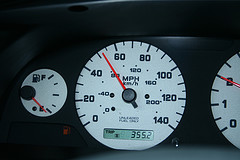The Internet's IPv4 Gas Tank is running on empty


Just like your car, unless you're a high-level network engineer or administrator, you're not going to notice any difference. The Internet isn't going to break or anything like that.
We are, however, running out Internet IPv4 addresses, the 32-bit numeric addresses that network devices need to connect to the Internet, even faster than we expected. Last fall, we thought that IANA would run out of numbers to give the RIRs on May 26th 2011. What happened?
What happened was all those mobile devices that we love so much, like smartphones, Android tablets, and iPads, have been using up IPv4 addresses even faster than we thought they would. ABI Research reported just today that "Worldwide mobile broadband-enabled subscriptions … will hit the one billion mark in 2011." The technologies, such as Network Address Translation (NAT) and Classless Inter-Domain Routing (CIDR), which we've been using to avoid running out of IPv4 addresses have finally proven insufficient.
According to the IPv4 Address Report, our IPv4 gas tank is now down to 1% of all IPv4 addresses left unassigned. At the rate, we're going this program predicts the RIRs' will issue their last addresses on September 24th 2011. I don't think we'll make it that long. I predict we'll run out some time this summer.
What will happen then? If you're just a happy Internet user, you probably won't notice much of anything... at first. Then, you may start noticing that your ISP bills start going up. If you run your own Web site, you'll see your Web hosting fees increase sooner than that. You may not know why your ISP and Web-hosting costs are going up, but they'll will be rising.
Behind the scenes what will be happening is that the big ISPs will start buying IP blocks from companies and organizations that already have large IP address blocks and aren't using them. For example, General Electric, Ford, Halliburton, and Eli Lilly all own /8, aka slash 8, IP blocks which consists of about 16 million IP addresses. To the best of my knowledge none of these companies use anything like that many addresses. For the most part, they obtained them back in the 90s when most people still thought that IPv4's approximately 4.3-billion addresses was a limitless resource. Now, those same blocks will become valuable commodities.
The ISPs and enterprises with longer term vision though will be switching their Internet infrastructure to IPv6. As Martin Levy, Hurricane Electric's Director of IPv6 Strategy, said, "In order to avoid costly capital expenditures down the road and possible failure on their business continuity plans, companies must make the migration to IPv6 sooner rather than later. Companies that fail to migrate to IPv6 will face a number of painful options, including buying expensive equipment to cobble together an address-sharing scheme or going out to the marketplace to acquire IP address space at a potentially exorbitant price."
Hurricane Electric, which is one of the leading IPv6 ISPs, clearly has reasons for wanting you to switch to over IPv6, but, they're also right. Businesses, ISPs, Web-hosting companies and, finally home users, are all going to need to switch to IPv6 and the sooner they get on with it the better. After all, it won't be long before that gas-tank warning light won't just be blinking at you, your Internet address engine is soon going to start sputtering, and you're going to hate the new IPv4 gas prices.